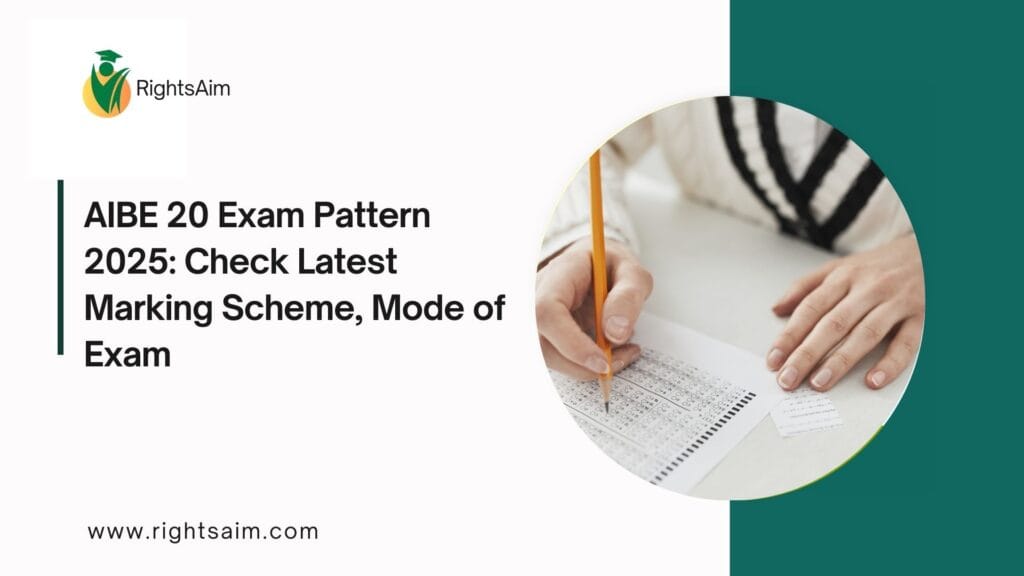The All India Bar Examination (AIBE) 20, conducted by the Bar Council of India (BCI), is a qualifying exam for law graduates aspiring to practice as advocates in Indian courts. Scheduled for 2025, the AIBE 20 will test candidates on their legal knowledge, reasoning skills, and application of law.
A clear understanding of the exam pattern is essential for effective preparation. This article covers the AIBE 20 exam structure, marking scheme, mode of exam, subjects covered, and the number of questions asked.

Overview of AIBE 20 Exam 2025
Exam Name: All India Bar Examination (AIBE 20)
Conducting Authority: Bar Council of India (BCI)
Exam Type: Certification exam (not an entrance test)
Purpose: To grant Certificate of Practice (COP) to law graduates
Mode of Exam: Offline (Pen-and-paper OMR sheet based)
Duration: 3 hours 30 minutes
Total Questions: 100
Question Type: Objective-type (Multiple Choice Questions)
Marking Scheme: +1 for every correct answer, no negative marking
AIBE 20 Exam Pattern 2025 – At a Glance
| Feature | Details |
|---|---|
| Mode of Exam | Offline (Pen-and-Paper OMR-based) |
| Duration | 3 Hours 30 Minutes |
| Total Questions | 100 |
| Type of Questions | Multiple Choice Questions (MCQs) |
| Maximum Marks | 100 |
| Marking Scheme | +1 for each correct answer |
| Negative Marking | None |
| Qualifying Marks | General/OBC – 40% (40 marks); SC/ST/PwD – 35% (35 marks) |
Mode of Exam
The AIBE 20 exam will be held in offline mode. Candidates will be provided with an OMR sheet on which they must mark their answers. This ensures transparency and uniformity in evaluation.
Earlier editions of AIBE allowed candidates to carry bare acts and reference materials, but recent changes have made the exam closed book. Candidates must now rely solely on their preparation and memory.
Duration of the Exam
The total duration is 3 hours 30 minutes (210 minutes).
There is no sectional time limit. Candidates can attempt the paper in any order within the given time.
PwD candidates with 40% or more disability are given an extra 30 minutes.
Type and Number of Questions
The exam will have 100 Multiple Choice Questions (MCQs).
Each question will carry 1 mark.
Questions will test:
Conceptual clarity
Application of legal principles
Professional ethics and responsibility
Basic knowledge of core law subjects
AIBE 20 Marking Scheme 2025
Correct Answer: +1 mark
Wrong Answer: 0 (no negative marking)
Unattempted Question: 0 marks
This no negative marking policy allows candidates to attempt all questions without fear of losing marks, making guesswork a possible strategy if unsure.
Minimum Qualifying Marks
To clear AIBE 20 and receive the Certificate of Practice, candidates must secure minimum qualifying marks as prescribed by the BCI.
| Category | Minimum Marks | Percentage |
|---|---|---|
| General/OBC | 40 marks | 40% |
| SC/ST/PwD | 35 marks | 35% |
Subject-Wise Weightage in AIBE 20 Exam 2025
The paper will cover 20 major law subjects, broadly based on the LL.B. curriculum. Below is the expected subject-wise distribution of marks/questions:
| Subject | Expected No. of Questions |
|---|---|
| Constitutional Law | 10 |
| Indian Penal Code (IPC) | 8 |
| Criminal Procedure Code (CrPC) | 10 |
| Code of Civil Procedure (CPC) | 10 |
| Evidence Act | 8 |
| Family Law | 8 |
| Public Interest Litigation | 4 |
| Professional Ethics & Cases of Professional Misconduct | 4 |
| Administrative Law | 3 |
| Company Law | 2 |
| Environmental Law | 2 |
| Cyber Law | 2 |
| Labour & Industrial Law | 4 |
| Intellectual Property Laws | 2 |
| Alternative Dispute Redressal (ADR) | 4 |
| Human Rights Law | 2 |
| Law of Tort, including Motor Vehicle Act | 5 |
| Law Related to Taxation | 2 |
| Land Acquisition Act | 2 |
| Other Miscellaneous Acts | 2 |
| Total | 100 |
(Note: The distribution is based on previous exam trends and official notifications.)
Key Features of AIBE 20 Exam Pattern
Offline Mode: The test is pen-and-paper based, ensuring accessibility even in remote areas.
No Negative Marking: Encourages candidates to attempt all questions.
Balanced Syllabus: Covers all core subjects taught in LL.B. courses.
Practical Orientation: Emphasis on professional ethics and real-world application of law.
Qualifying Nature: The exam does not rank candidates; it only determines if they are eligible to practice law.
How to Approach AIBE 20 Preparation Based on Exam Pattern
Focus on Core Subjects: Prioritize Constitution, IPC, CrPC, CPC, and Evidence Act, as they carry higher weightage.
Revise Bare Acts: Memorize key sections and provisions since it is now a closed-book exam.
Practice Mock Tests: Simulate real exam conditions to improve time management.
Professional Ethics: Don’t ignore this small yet crucial section as questions are straightforward and scoring.
Current Legal Developments: Stay updated with recent judgments, amendments, and landmark cases.
Frequently Asked Questions (FAQs) on AIBE 20 Exam Pattern 2025
1. How many questions are asked in AIBE 20?
✅ A total of 100 multiple-choice questions will be asked.
2. What is the mode of AIBE 2025?
✅ AIBE 20 will be conducted in offline (pen-and-paper) mode.
3. Is there negative marking in AIBE 20?
❌ No, there is no negative marking.
4. What are the qualifying marks for AIBE 20?
✅ General/OBC candidates need 40%, while SC/ST/PwD candidates need 35%.
5. Is AIBE 20 an open-book exam?
❌ No, the exam is now closed book, though candidates may be allowed to carry Bare Acts without notes (based on final instructions from BCI).
Conclusion
The AIBE 20 Exam Pattern 2025 emphasizes conceptual clarity, professional ethics, and application-based knowledge. With 100 objective-type questions, 3.5 hours duration, no negative marking, and offline mode, the exam remains accessible yet challenging for law graduates.
Candidates must align their preparation with the subject weightage and marking scheme, focusing on Constitutional Law, IPC, CrPC, CPC, and Evidence Act, while not ignoring smaller but scoring sections like Professional Ethics and PIL.


